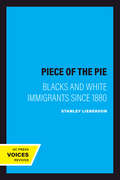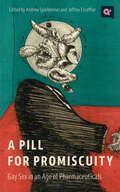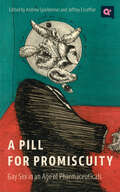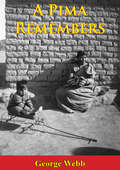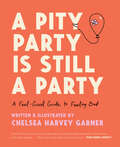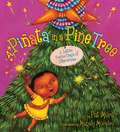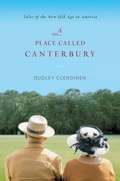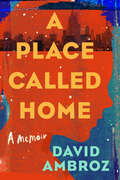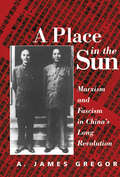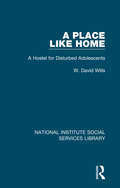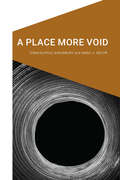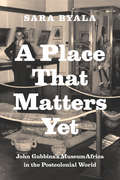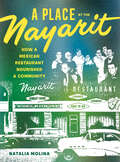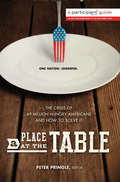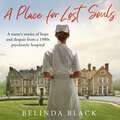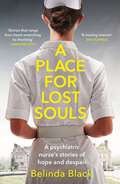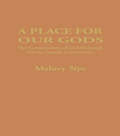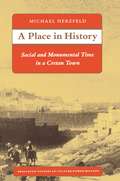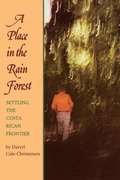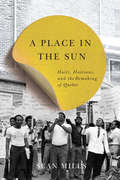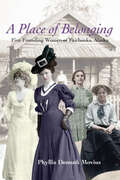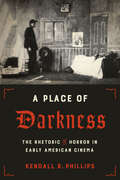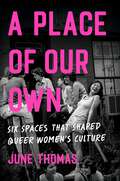- Table View
- List View
A Piece of the Pie: Blacks and White Immigrants Since 1880
by Stanley LiebersonThere is little question that the descendants of the new European immigrant groups from Southern, Central, and Eastern Europe have done very well in the United States, reaching levels of achievement far above blacks. Yet the new Europeans began to migrate to the United States in 1880, a time when blacks were no longer slaves. Why have the new immigrants fared better than the blacks? This volume focuses on the historical origins of the current differences between the groups.Professor Lieberson scoured early U. S. censuses and used a variety of offbeat information sources to develop data that would throw light on this question, as well as provide new information on occupations at the turn of the century, finding remarkable parallels between the black position in the urban South and the urban North. He examines and compares progress in education and in politics between the new Europeans and the blacks. What were the effects of segregation? Why did labor unions discriminate more severely against blacks than against the new immigrant groups? This book will generate a fresh interpretation of the origins of black-new European differences, one which explains why other nonwhite groups, such as the Chinese and Japanese, have done relatively well.
A Pill for Promiscuity: Gay Sex in an Age of Pharmaceuticals (Q+ Public)
by Andrew Holleran Jeffrey Escoffier Kane Race Andrew R. Spieldenner Steve MacIsaac Daniel Felsenthal Nicolas Flores Alex Garner Deion Hawkins Pam Dore Addison Vawters Lore Tta LeMaster Ariel Sabillon Justice Jamal Jones Jeff WeinsteinFor a generation of gay men who came of age in the 1980s and 1990s, becoming sexually active meant confronting the dangers of catching and transmitting HIV. In the 21st century, however, the development of viral suppression treatments and preventative pills such as PrEP and nPEP has massively reduced the risk of acquiring HIV. Yet some of the stigma around gay male promiscuity and bareback sex has remained, inhibiting open dialogues about sexual desire, risk, and pleasure. A Pill for Promiscuity brings together academics, artists, and activists—from different generations, countries, ethnic backgrounds, and HIV statuses—to reflect on how gay sex has changed in a post-PrEP era. Some offer personal perspectives on the value of promiscuity and the sexual communities it fosters, while others critique unequal access to PrEP and the increased role Big Pharma now plays in gay life. With a diverse group of contributors that includes novelist Andrew Holleran, trans scholar Lore/tta LeMaster, cartoonist Steve MacIsaac, and pornographic film director Mister Pam, this book asks provocative questions about how we might reimagine queer sex and sexuality in the 21st century.
A Pill for Promiscuity: Gay Sex in an Age of Pharmaceuticals (Q+ Public)
by Andrew Holleran Jeffrey Escoffier Kane Race Andrew R. Spieldenner Steve MacIsaac Daniel Felsenthal Nicolas Flores Alex Garner Deion Hawkins Pam Dore Addison Vawters Lore Tta LeMaster Ariel Sabillon Justice Jamal Jones Jeff WeinsteinFor a generation of gay men who came of age in the 1980s and 1990s, becoming sexually active meant confronting the dangers of catching and transmitting HIV. In the 21st century, however, the development of viral suppression treatments and preventative pills such as PrEP and nPEP has massively reduced the risk of acquiring HIV. Yet some of the stigma around gay male promiscuity and bareback sex has remained, inhibiting open dialogues about sexual desire, risk, and pleasure. A Pill for Promiscuity brings together academics, artists, and activists—from different generations, countries, ethnic backgrounds, and HIV statuses—to reflect on how gay sex has changed in a post-PrEP era. Some offer personal perspectives on the value of promiscuity and the sexual communities it fosters, while others critique unequal access to PrEP and the increased role Big Pharma now plays in gay life. With a diverse group of contributors that includes novelist Andrew Holleran, trans scholar Lore/tta LeMaster, cartoonist Steve MacIsaac, and pornographic film director Mister Pam, this book asks provocative questions about how we might reimagine queer sex and sexuality in the 21st century.
A Pima Remembers
by George WebbThe lifestyle of a people, preserved in the memory of a Pima whose life ran from the late 1800s to the Space Age. The universality of man’s eternal hope of betterment is reflected in the wisdom of the Pimas:So now I hopeYou will striveTo make this dayThe best in your life.George Webb. “…a book which seems to have grown right out of the Arizona earth—anecdotal, almost artless in its directness, but having the impact of reality…a flavorsome re-creation of things past in the life of a friendly, generous people.”— The New York Times“George Webb’s gentle recollections of his childhood and Pima Indian lifeways will doubtless endure forever. This deeply moving autobiography is the perfect introduction for younger Pimas to their culture and history.” —Arizona Highways“This extraordinarily pleasant and amiable narrative wakes vivid an ancient and happy way of life”—Oliver LaFarge
A Pity Party Is Still a Party: A Feel-Good Guide to Feeling Bad
by Chelsea Harvey GarnerMost of us try to avoid feeling sad, but in this candid, comical, and deeply-felt book, therapist Chelsea Harvey Garner doesn’t just argue that the future will be brighter if we learn to enjoy the unenjoyable and support each other when the vibes aren’t so good, she also shows us how. What if all the advice we’ve received about “looking on the bright side” is wrong? What if sadness is actually the key to happiness, and can even be . . . fun? Garner is here to make that case. In this feel-good guide to feeling bad, she claims it’s not enough for us to tolerate hard feelings. We need to embrace them. We need to let them show by crying with others. Often. In public.Playful, at times irreverent, but always sincere, Garner is the grown-up Miss Frizzle for the therapy generation. She believes that if we want to build a world where mental health is the norm, we have to lean into connection and count on each other, even—and perhaps especially—at our worst.Through anecdotes about her own hardships and insights gained in her clinical practice, Garner illuminates the power (and embarrassment) of opening up. Featuring solo exercises, group activities, and journal prompts alongside personal essays, she invites us to see emotions in a new light and engage with them in a healthier way. A Pity Party is Still a Party helps us find the silver lining, but only after we’ve played in the rain.
A Piñata in a Pine Tree: A Latina Twelve Days of Christmas
by Pat Mora"The Twelve Days of Christmas" has been a beloved carol for centuries. In this joyful new version, the traditional gifts have been replaced by Latin-flavored offerings with a tinge of magic. A secret amiga delivers presents to a little girl, filling the pages with brightly colored piñatas, burritos bailando (dancing donkeys), lunitas cantando (singing moons), and more. There are things to find and count and words in Spanish on every page, with pronunciations provided right in the pictures, and a glossary and music at the end of the book.
A Place Against Time: Land and Environment in the Papua New Guinea Highlands (Studies in Environmental Anthropology #Vol. 1)
by Paul SillitoeA Place Against Time is an ethnographically focused environmental study of Montane, New Guinea, where people were among the world's first to cultivate crops some ten millennia ago, and where today an enduring agricultural condition continues. It arranges its account of climate, vegetation topography and geology according to their relationship with the soils of the region occupied by Wola speakers in the Southern Highlands Province of Papua New Guinea, in the Western Pacific. This book breaks new intellectual ground as an ethno-environmental investigation with a soils perspective, ethno-pedology being a little researched topic to date.
A Place Called Canterbury
by Dudley ClendinenAn "affectionate, touchingly empathetic" (Janet Maslin, The New York Times) look at old age in America today Welcome to Canterbury Tower , an apartment building in Florida, where the residents are busy with friendships, love, sex, money, and gossip-and the average age is eightysix. Journalist Dudley Clendinen's mother moved to Canterbury in 1994, planning-like most the inhabitants-to spend her final years there. But life was not over yet for the feisty southern matron. There, she and her eccentric new friends lived out a soap opera of dignity, nerve, and humor otherwise known as the New Old Age. A Place Called Canterbury is both a journalist's account of the last years of the Greatest Generation and a son's rueful memoir of his mother. Entertaining and unsparing, it is essential reading for anyone with aging parents, and those wondering what their own old age might look like. .
A Place Called Home: A Memoir
by David AmbrozPORCHLIGHT BESTSELLER Zibby Owens 2022 Book of the Year A galvanizing, stirring memoir about growing up homeless and in foster care and rising to become a leading advocate for child welfare, recognized by President Obama as an American Champion of Change. &“You will fall in love with David Ambroz, his beautifully-told, gut-wrenching story, and his great big heart.&” —Jeanette Walls, author of The Glass Castle &“It's impossible to read A Place Called Home and not want to redouble your efforts to fight the systems of poverty that have plagued America for far too long. In this book, David shares his deeply personal story and issues a rousing call to make this a more humane and compassionate nation.&”—Hillary Rodham Clinton There are millions of homeless children in America today and in A Place Called Home, award-winning child welfare advocate David Ambroz writes about growing up homeless in New York for eleven years and his subsequent years in foster care, offering a window into what so many kids living in poverty experience every day. When David and his siblings should be in elementary school, they are instead walking the streets seeking shelter while their mother is battling mental illness. They rest in train stations, 24-hour diners, anywhere that&’s warm and dry; they bathe in public restrooms and steal food to quell their hunger. When David is placed in foster care, at first it feels like salvation but soon proves to be just as unsafe. He&’s moved from home to home and, in all but one placement, he&’s abused. His burgeoning homosexuality makes him an easy target for other&’s cruelty. David finds hope and opportunities in libraries, schools, and the occasional kind-hearted adult; he harnesses an inner grit to escape the all-too-familiar outcome for a kid like him. Through hard work and unwavering resolve, he is able to get a scholarship to Vassar College, his first significant step out of poverty. He later graduates from UCLA Law with a vision of using his degree to change the laws that affect children in poverty. Told with lyricism and sparkling with warmth, A Place Called Home depicts childhood poverty and homelessness as it is experienced by so many young people who have been systematically overlooked and unprotected. It&’s at once a gripping personal account of deprivation—how one boy survived it, and ultimately thrived—and a resounding call for readers to move from empathy to action.
A Place In The Sun: Marxism And Fascimsm In China's Long Revolution
by A. James GregorChina has endured a century of turmoil, beginning with the anti-dynastic revolution associated with Sun Yat-Sen, through the military and tutelary rule of Chiang Kai-shek, the revolutionary regime of Mao Zedong, and the radical reforms of Deng Xiaoping. China has had little respite. Historians and social scientists have attempted to understand some of this history as being the consequence of the impact of European ideologies-including Marxism, Marxism-Leninism, and Fascism. Rarely instructive or persuasive, the discussions regarding this issue have, more often than not, led to puzzlement, rather than enlightenment.In A Place in the Sun, A. James Gregor offers an interpretation of the role of European Marxist and Fascist ideas on China's revolutionaries that is both original, and based on a lifetime of scholarship devoted to revolutionary ideologies. Gregor renders a detailed analysis of their respective influence on major protagonists. In the exposition, Gregor reveals an unsuspected and complex set of relationships between the Chinese revolution and essentially European ideologies. His discussion concludes with a number of estimations that suggest implications for the future of modern China, and its relationship with the advanced industrial democracies. How post-Dengist China-the world's most populous nation-is to be understood remains uncertain to most comparativists and historians. Gregor provides one well supported alternative, and he is carefully attentive to the implications of this alternative.
A Place Like Home: A Hostel for Disturbed Adolescents (National Institute Social Services Library)
by W. David WillsThe late David Wills spent a lifetime in the service of the so-called delinquent, the misfit, the maladjusted. He was the first Englishman to train as a psychiatric social worker and was well known for his books The Hawkspur Experiment, The Barns Experiment, etc. Originally published in 1970, this book describes another experiment with a hostel for boys leaving schools for maladjusted children and lacking any settled home from which to enter the community. It demonstrates once again David Wills’s conviction that the offender wants to be ‘good’ and will be helped by affection rather than by punishment. Yet it is obvious that the work was full of stress and that only people with some of the attributes of archangels could respond to the boys’ needs and remain in control of the situation. The book demonstrates the extent of deprivation suffered by such young people and that no ordinary hostels or lodgings will do if they are to be set upon a less turbulent course of life, leading to truly adult independence. It added greatly to our understanding of the personalities, experience of life and needs of maladjusted boys in their ‘teens at the time, although the lessons drawn from it were disturbing in relation both to prevention and treatment. The penetration of David Wills’s assessment is beyond doubt and (as Dame Eileen Younghusband concludes in her Foreword) his book will give a great deal to those ‘trying in various capacities to help boys and girls who otherwise would grow into adulthood permanently handicapped emotionally and socially’. This book is a re-issue originally published in 1970. The language used is a reflection of its era and no offence is meant by the Publishers to any reader by this re-publication.
A Place More Void (Cultural Geographies + Rewriting the Earth)
by Paul Kingsbury Anna J. SecorA Place More Void takes its name from a scene in William Shakespeare&’s The Tragedy of Julius Caesar, wherein an elderly soothsayer has a final chance to warn Caesar about the Ides of March. Worried that he won&’t be able to deliver his message because of the crowded alleyways, the soothsayer devises a plan to find and intercept Caesar in &“a place more void.&” It is precisely such an elusive place that this volume makes space for by theorizing and empirically exploring the many yet widely neglected ways in which the void permeates geographical thinking. This collection presents geography&’s most in-depth and sustained engagements with the void to date, demonstrating the extent to which related themes such as gaps, cracks, lacks, and emptiness perforate geography&’s fundamental concepts, practices, and passions. Arranged in four parts around the themes of Holes, Absences, Edges, and Voids, the contributions demonstrate the fecundity of the void for thinking across a wide range of phenomena: from archives to alien abductions, caves to cryptids, and vortexes to vanishing points.A Place More Void gathers established and emerging scholars who engage a wide range of geographical issues and who express themselves not only through archival, literary, and socio-scientific investigations, but also through social and spatial theory, political manifesto, poetry, and performance art.
A Place That Matters Yet: John Gubbins's MuseumAfrica in the Postcolonial World
by Sara ByalaA Place That Matters Yet unearths the little-known story of Johannesburg’s MuseumAfrica, a South African history museum that embodies one of the most dynamic and fraught stories of colonialism and postcolonialism, its life spanning the eras before, during, and after apartheid. Sara Byala, in examining this story, sheds new light not only on racism and its institutionalization in South Africa but also on the problems facing any museum that is charged with navigating colonial history from a postcolonial perspective. Drawing on thirty years of personal letters and public writings by museum founder John Gubbins, Byala paints a picture of a uniquely progressive colonist, focusing on his philosophical notion of “three-dimensional thinking,” which aimed to transcend binaries and thus—quite explicitly—racism. Unfortunately, Gubbins died within weeks of the museum’s opening, and his hopes would go unrealized as the museum fell in line with emergent apartheid politics. Following the museum through this transformation and on to its 1994 reconfiguration as a post-apartheid institution, Byala showcases it as a rich—and problematic—archive of both material culture and the ideas that surround that culture, arguing for its continued importance in the establishment of a unified South Africa.
A Place at the Nayarit: How a Mexican Restaurant Nourished a Community
by Natalia MolinaIn a world that sought to reduce Mexican immigrants to invisible labor, the Nayarit was a place where people could become visible once again, where they could speak out, claim space, and belong. In 1951, Doña Natalia Barraza opened the Nayarit, a Mexican restaurant in Echo Park, Los Angeles. With A Place at the Nayarit, historian Natalia Molina traces the life’s work of her grandmother, remembered by all who knew her as Doña Natalia––a generous, reserved, and extraordinarily capable woman. Doña Natalia immigrated alone from Mexico to L.A., adopted two children, and ran a successful business. She also sponsored, housed, and employed dozens of other immigrants, encouraging them to lay claim to a city long characterized by anti-Latinx racism. Together, the employees and customers of the Nayarit maintained ties to their old homes while providing one another safety and support. The Nayarit was much more than a popular eating spot: it was an urban anchor for a robust community, a gathering space where ethnic Mexican workers and customers connected with their patria chica (their "small country"). That meant connecting with distinctive tastes, with one another, and with the city they now called home. Through deep research and vivid storytelling, Molina follows restaurant workers from the kitchen and the front of the house across borders and through the decades. These people's stories illuminate the many facets of the immigrant experience: immigrants' complex networks of family and community and the small but essential pleasures of daily life, as well as cross-currents of gender and sexuality and pressures of racism and segregation. The Nayarit was a local landmark, popular with both Hollywood stars and restaurant workers from across the city and beloved for its fresh, traditionally prepared Mexican food. But as Molina argues, it was also, and most importantly, a place where ethnic Mexicans and other Latinx L.A. residents could step into the fullness of their lives, nourishing themselves and one another. A Place at the Nayarit is a stirring exploration of how racialized minorities create a sense of belonging. It will resonate with anyone who has felt like an outsider and had a special place where they felt like an insider.
A Place at the Table: The Crisis of 49 Million Hungry Americans and How to Solve It
by Peter Pringle Participant MediaForty-nine million people#151;including one in four children#151;go hungry in the U. S. every day, despite our having the means to provide nutritious, affordable food for all. Inspired by the acclaimed documentaryA Place at the Table, this companion book offers powerful insights from those at the front lines of solving hunger in America, including: Jeff Bridges, Academy Award#150;winning actor, cofounder of the End Hunger Network, and spokesperson for the No Kid Hungry Campaign, on raising awareness about hunger Ken Cook, president of Environmental Working Group, unravels the inequities in the Farm Bill and shows how they affect America’s hunger crisis Marion Nestle, nutritionist and acclaimed critic of the food industry, whose latest work tracks the explosion of calories in today’s #147;Eat More” environment Bill Shore, Joel Berg, and Robert Egger, widely-published anti-hunger activists, suggest bold and diverse strategies for solving the crisis Janet Poppendieck, sociologist, bestselling author, and well-known historian of poverty and hunger in America, argues the case for school lunch reform Jennifer Harris, of Yale University’s Rudd Center for Food Policy and Obesity, uncovers the new hidden persuaders of web food advertisers David Beckmann, head of Bread for the World, andSarah Newman, researcher onA Place at the Table, explore the intersection of faith and feeding the hungry Mariana Chilton, Philadelphia pediatrician and anti-hunger activist, tells the moving story of her extraordinary lobby group, Witnesses to Hunger Tom Colicchio, chef and executive producer of television’sTop Chef, presents his down-to-earth case to Washington for increases in child nutrition programs Andy Fisher, veteran activist in community food projects, argues persuasively why we have to move beyond the charity-based emergency feeding program Kelly Meyer, cofounder of Teaching Gardens, illuminates the path to educating, and providing healthy food for, all children Kristi Jacobson and Lori Silverbush, the film’s directors/producers, tell their personal stories of how and why they came to make the documentary Hunger and food insecurity pose a deep threat to our nation. A Place at the Tableshows they can be solved once and for all, if the American public decides#151;as they have in the past#151;that making healthy food available, and affordable, is in the best interest of us all.
A Place for Lost Souls: A nurse's stories of hope and despair from a 1980s psychiatric hospital
by Belinda BlackA young psychiatric nurse recalls her eye-opening experiences at one of Britain's secure mental hospitals during the 1980s.'Ultimately, my experiences as a mental health nurse have taught me that we should judge less and open our hearts more.'Belinda Black was just seventeen years old when she began working as a nursing assistant at the large and foreboding 'madhouse', as it was then known to the villagers of her hometown in the north of England. Following in the footsteps of her mother, she went on to spend a decade caring for patients with widely varying mental health problems, all locked up together and out of view of society. They included:Olek - a haunted, diminished and damaged survivor of a Nazi concentration campOrla - whose peaceful demeanour and lovely smile hid a determination to kill herselfAgatha - an extremely violent paranoid schizophrenic with a wonderful sense of humourWarren - who stabbed a person to death after he was let out.But A Place for Lost Souls is also about the other psychiatric nurses there, from those like Sister Kane who suffered from depression and found treating others a welcome distraction, to others like Belinda's friend Sally, who always had a sense of humour however dark the situation.Together, against a backdrop of rattling keys, clanging iron doors, and wards that smelled of disinfectant and stale smoke, these people came together to get through another day. Until the hospital, along with many others, had its doors closed in 1991 - the biggest change to mental healthcare in NHS history.The result is a moving, shocking but ultimately life-affirming account of a unique and noble profession, told from the frontlines. Amongst so much sadness and distress, and despite witnessing some of the darkest corners of human suffering, Belinda finds hope: in the camaraderie of her colleagues, in the patients she cares for, and in her unwavering belief that even people who have committed violent crimes are fundamentally good.(P) 2023 Quercus Editions
A Place for Lost Souls: A nurse's stories of hope and despair from a 1980s psychiatric hospital
by Belinda Black'Ultimately, my experiences as a mental health nurse have taught me that we should judge less and open our hearts more.'Belinda Black was just seventeen years old when she began working as a nursing assistant at the large and foreboding 'madhouse', as it was then known to the villagers of her hometown in the north of England. Following in the footsteps of her mother, she went on to spend a decade caring for patients with widely varying mental health problems, all locked up together and out of view of society. Some had suffered unimaginable trauma, several had violent and volatile tendencies, but amongst this Belinda found moments of joy and even friendship with her patients.Together, against a backdrop of rattling keys, clanging iron doors, and wards that smelled of disinfectant and stale smoke, these people came together to get through another day. Until the hospital, along with many others, had its doors closed in 1991 - the biggest change to mental healthcare in NHS history.The result is a moving, shocking but ultimately life-affirming account of a unique and noble profession, told from the frontlines.
A Place for Our Gods: The Construction of an Edinburgh Hindu Temple Community
by Malory NyeStudy of some 150 Hindu families (and about 1000 persons) living in Edinburgh, and particularly about the fact that two associations exist among them, one of which is based on activities at a temple.
A Place in History: Social and Monumental Time in a Cretan Town (Princeton Studies in Culture/Power/History)
by Michael HerzfeldMichael Herzfeld describes what happens when a bureaucracy charged with historic conservation clashes with a local populace hostile to the state and suspicious of tourism. Focusing on the Cretan town of Rethemnos, once a center of learning under Venetian rule and later inhabited by the Turks, he examines major questions confronting conservators and citizens as they negotiate the "ownership" of history: Who defines the past? To whom does the past belong? What is "traditional" and how is this determined? Exploring the meanings of the built environment for Rethemnos's inhabitants, Herzfeld finds that their interest in it has more to do with personal histories and the immediate social context than with the formal history that attracts the conservators. He also investigates the inhabitants' social practices from the standpoints of household and kin group, political association, neighborhood, gender ideology, and the effects of these on attitudes toward home ownership. In the face of modernity, where tradition is an object of both reverence and commercialism, Rethemnos emerges as an important ethnographic window onto the ambiguous cultural fortunes of Greece.
A Place in the Rain Forest: Settling the Costa Rican Frontier
by Darryl Cole-ChristensenIn the 1950s, Darryl Cole-Christensen and his family were among the first settlers of the Coto Brus, an almost impenetrable, mountainous rain forest region of southeastern Costa Rica. In this evocative book, he captures the elemental struggles and rewards of settling a new frontier--an experience forever closed to most people in Western, urbanized society.<P><P>With the perspective of more than forty years' residence in the Coto Brus, Cole-Christensen ably describes both the settlers' dreams of bringing civilization and progress to the rain forest and the sweeping and irreversible changes they caused throughout the ecosystem as they cut the rain forest down. Writing neither to apologize for nor to defend their actions, he instead illuminates the personal and subjective factors that cause people to risk danger and hardship for the uncertain rewards of settling a frontier.
A Place in the Sun: Haiti, Haitians, and the Remaking of Quebec (Studies on the History of Quebec/Études d'histoire du Québec #31)
by Sean MillsWhat is the relationship between migration and politics in Quebec? How did French Canadians’ activities in the global south influence future debates about migration and Quebec society? How did migrants, in turn, shape debates about language, class, nationalism and sexuality? A Place in the Sun explores these questions through overlapping histories of Quebec and Haiti. From the 1930s to the 1950s, French-Canadian and Haitian cultural and political elites developed close intellectual bonds and large numbers of French-Canadian missionaries began working in the country. Through these encounters, French-Canadian intellectual and religious figures developed an image of Haiti that would circulate widely throughout Quebec and have ongoing cultural ramifications. After first exploring French-Canadian views of Haiti, Sean Mills reverses the perspective by looking at the many ways that Haitian migrants intervened in and shaped Quebec society. As the most significant group seen to integrate into francophone Quebec, Haitian migrants introduced new perspectives into a changing public sphere during decades of political turbulence. By turning his attention to the ideas and activities of Haitian taxi drivers, exiled priests, aspiring authors, dissident intellectuals, and feminist activists, Mills reconsiders the historical actors of Quebec intellectual and political life, and challenges the traditional tendency to view migrants as peripheral to Quebec history. Ranging from political economy to discussions about sexuality, A Place in the Sun demonstrates the ways in which Haitian migrants opened new debates, exposed new tensions, and forever altered Quebec society.
A Place of Belonging: Five Founding Women of Fairbanks, Alaska
by Phyllis Demuth MoviusAlaska has always attracted people from varied backgrounds. In A Place of Belonging, Phyllis Movius introduces us to five women who settled in Fairbanks between 1903 and 1923 and who typify the disparate population that has long enriched Alaska. The women’s daily lives and personal stories are woven together in these biographical portraits, drawn from the women’s letters, memoirs, personal papers, club records, their own oral histories and published writings. Enriched by many never-before-published historical photos, Movius’s research gives us a unique inroad into life on the frontier.
A Place of Darkness: The Rhetoric of Horror in Early American Cinema
by Kendall R. Phillips&“An illuminating history . . . it&’s clear that the right story can still terrify us; A Place of Darkness is a primer on how the movies learned to do it.&” —NPR Horror is one of the most enduringly popular genres in cinema. The term &“horror film&” was coined in 1931 between the premiere of Dracula and the release of Frankenstein, but monsters, ghosts, demons, and supernatural and horrific themes have been popular with American audiences since the emergence of novelty cinematographic attractions in the late 1890s. A Place of Darkness illuminates the prehistory of the horror genre by tracing the way horrific elements and stories were portrayed in films prior to the introduction of the term &“horror film.&” Using a rhetorical approach that examines not only early films but also the promotional materials for them and critical responses to them, Kendall R. Phillips argues that the portrayal of horrific elements was enmeshed in broader social tensions around the emergence of American identity and, in turn, American cinema. He shows how early cinema linked monsters, ghosts, witches, and magicians with Old World superstitions and beliefs, in contrast to an American way of thinking that was pragmatic, reasonable, scientific, and progressive. Throughout the teens and twenties, Phillips finds, supernatural elements were almost always explained away as some hysterical mistake, humorous prank, or nefarious plot. The Great Depression of the 1930s, however, constituted a substantial upheaval in the system of American certainty and opened a space for the reemergence of Old-World gothic within American popular discourse in the form of the horror genre, which has terrified and thrilled fans ever since. &“[A] fascinating read.&” —Sublime Horror
A Place of Darkness: The Rhetoric of Horror in Early American Cinema
by Kendall R. Phillips&“An illuminating history . . . it&’s clear that the right story can still terrify us; A Place of Darkness is a primer on how the movies learned to do it.&” —NPR Horror is one of the most enduringly popular genres in cinema. The term &“horror film&” was coined in 1931 between the premiere of Dracula and the release of Frankenstein, but monsters, ghosts, demons, and supernatural and horrific themes have been popular with American audiences since the emergence of novelty cinematographic attractions in the late 1890s. A Place of Darkness illuminates the prehistory of the horror genre by tracing the way horrific elements and stories were portrayed in films prior to the introduction of the term &“horror film.&” Using a rhetorical approach that examines not only early films but also the promotional materials for them and critical responses to them, Kendall R. Phillips argues that the portrayal of horrific elements was enmeshed in broader social tensions around the emergence of American identity and, in turn, American cinema. He shows how early cinema linked monsters, ghosts, witches, and magicians with Old World superstitions and beliefs, in contrast to an American way of thinking that was pragmatic, reasonable, scientific, and progressive. Throughout the teens and twenties, Phillips finds, supernatural elements were almost always explained away as some hysterical mistake, humorous prank, or nefarious plot. The Great Depression of the 1930s, however, constituted a substantial upheaval in the system of American certainty and opened a space for the reemergence of Old-World gothic within American popular discourse in the form of the horror genre, which has terrified and thrilled fans ever since. &“[A] fascinating read.&” —Sublime Horror
A Place of Our Own: Six Spaces That Shaped Queer Women's Culture
by June ThomasA &“riveting&” and &“indispensable&” (Alison Bechdel) cultural history of queer women&’s lives in the second half of the twentieth century, told through six iconic spaces For as long as queer women have existed, they&’ve created gathering grounds where they can be themselves. From the intimate darkness of the lesbian bar to the sweaty camaraderie of the softball field, these spaces aren&’t a luxury—they&’re a necessity for queer women defining their identities. In A Place of Our Own, journalist June Thomas invites readers into six iconic lesbian spaces over the course of the last sixty years, including the rural commune, the sex toy boutique, the vacation spot, and the feminist bookstore. Thomas blends her own experiences with archival research and rare interviews with pioneering figures like Elaine Romagnoli, Susie Bright, and Jacqueline Woodson. She richly illustrates the lives of the business owners, entrepreneurs, activists, and dreamers who shaped the long struggle for queer liberation. Thomas illuminates what is gained and lost in the shift from the exclusive, tight-knit women&’s spaces of the &’70s toward today&’s more inclusive yet more diffuse LGBTQ+ communities. At once a love letter, a time capsule, and a bridge between generations of queer women, A Place of Our Own brings the history—and timeless present—of the lesbian community to vivid life.
